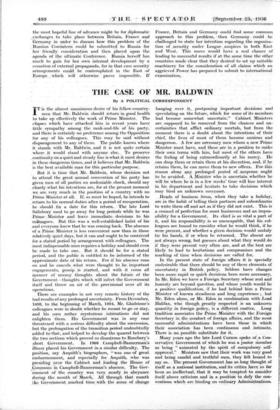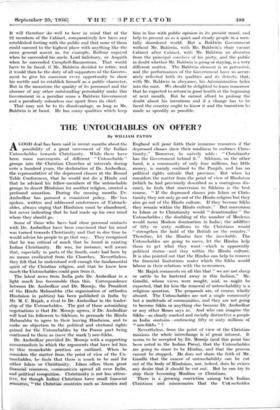THE CASE OF MR. BALDNiTIN
By A- POLITICAL CORRESPONDENT
But it is time that Mr. Baldwin, whose decision. not to. attend the great annual convention of his party has given men of all parties an undeniable, shock, should say :clearly twhat his intentions are, for at the present-moment we are_ very much_ in the position of a country with- no Prime Minister at all; If, as must be hoped, he intends to return to his normal duties after a period of recuperation, he should :fix a date for this return.: The late Lord Salisbury used to go away for long, periods while he was .Prime7:Minister and leave . immediate; :decisions to. his colleagues. But. this was a well-established habit of his sand everyone knew that he was .coming back. The absence of a Prime Minister is less convenient now than inAhose relatively quiet. days, but.it can and ought to be contrived for a stated period, by arrangement with colleagues. The :most indispensable man requires a holiday and should even be made to take one.. But it_ should be for a, stated :period, and the public is entitled ,to be informed of the approximate date of. his return. For.if his absence runs -on and he cancels .what were thought to be, important -engagements, gossip, .is started, and with . it come all manner of uneasy thoughts about the. futUre_ of the Government—thoughts which, will infect the. Government itself .and throw an air of the, provisional over all its operations.
There are examples in not very remote history of the bad results of any prolonged uncertainty. From December, ;1898,, to. the beginning of March, 1894, Mr. Glinistone's _colleagues were in doubt ,whether he meant to go or :stay, and his on _rather., Mysterious • intimations did not enlighten them. His Government was in any case threatened with a serious difficulty about the succession, -but the prolongation of the transition period undoubtedly added to that, and helped to develop the quarrel between the two sections which proved so-disastrous to R.osebery's short Government. In 1908 .Campbell-Bannerman's illness placed his Government in a similar difficulty. The position,, say Asquith's biographers, "was one of great embarrassment, and especially for, Asquith, who was presiding over the _Cabinet_ and leading , the House of commons Carepbell-fhtnnerman's absence. The GO- -ernment of the country was very nearly in abeyance during the month of March, All through that month Government_ narked time.-with the sense of change hanging over . it, postponing important decisions and speculating on the future, which for some of its members . had become somewhat uncertain." Cabinet Ministers are supposed to, be removed from the chances and un- certainties- that afflict oidinary mortals, 'but from the moment there is a doubt about the intentions of their . chief, the lives of most of them become anxious and dangerous. A few are necessary men whom a, new. Prime Minister must: have, and these. are in a position to make .their own_ terms :with him, but most of the others have the feeling of being extraordinarily at his mercy. He ,_can drop them or retainthem at his, discretion,. and, if, he retains them, he can, move. them to. new offices.; For, this .reason alone Any .prolonged peAiocl suspense; ought to be avoided. &Minister who is uncertain whether lie will be where he •is in a.few weeks' time will lose interest in, his department and hesitate to take decisions which may bind an :unknown successor. .
Heads of .business .firms, when •they take a holiday, are in the habit of telling their partners and subordinates to write them off and act as ifthey did not exist. This is a .counsel of perfection for most businesses and an impos- sibility for a Government. Its chief is so vital a part of it, and his responsibility is so unescapable, that his. col- leagues are _hound to consider what he would think, if be were ,present, and whether a given decision,would unduly tie his, hands, _if or when he returned.. The absent are not always wrong, but guesses about what they would do if they, were present very often Are, and at the best are likely. to lead to hesitations and compromises and the marking of time when decisions are called for, In the present _state of foreign affairs it is specially undesirable that there, should be any, of these elements of uncertainty in British.; policy. Seldom have changes been more rapid or quick decisions been more necessary. In Mr., Eden, we have a Foreign Secretary _whose zeal and honesty are beyond question, and whose youth would be a positive 'qualification, . if he had behind him a Prime Minister of known steadiness and long. experience ;.. but Mr. Eden, alone,. a -L or Mr, FAlen in combintion with ord lialifax, who though_ greatly respected is an unknown quantity _in foreign policy, is. .a different matter... Long tradition associates the Prime .Minister. with the. Foreign Secretary. in .themonduct of foreign affairs, and the most successful administrations have been those in which their association has been continuous and intimate. There is no, possible substitute for it.
Many years ago the late Lord Curzon spoke of a Con- servative Government-of which he was a junior member as being " animated by the spirit . of. compulsory . self- approval." Ministers saw that their work was very good and being candid and truthful men, they felt bound to say so. The present Government has so long thought of itself as a national institution, and its critics have so far been so ineffectual, that it may be tempted to consider itself above criticism and in a position to defy the con- ventions which are binding, on ordinary Administrations. It will therefore-do-well to bear in mind' that -of the 22 members of the' Cabinet, comparatively few have• any established footing with the public and that none' of them could succeed to the highest place with anything liketbe same general assent as, for example, Balfour enjoyed when he succeeded his uncle, Lord Salisbury, or Asquith when he succeeded' Campbell-Bannerthan. That would have- tir be -faced, if Mr. Baldwin decided to retke;'irrid it would-then be the duty of all supporters of the-Govern- ment to give his successor every opportunity to show his mettle and to establish himself as a public character. But in the meantime the quality of its personnel and the absence of any other outstanding' personality make this Government- in a peculiar sense a Baldwin Government and a peculiarly colourless one apart from its chief. - That may not be to its disadvantage, so long as Mr. Baldwin-is it' hand. He has many qualities which keep him in line with public opinion ih its present mood, and help •to present us as a quiet and steady people in a Men- tally disordered world. 'But a Baldwin Governinent Without' Mr. Baldwin, With Mr. Baldwin's chair vacant Cabinet after Cabinet, with Mr. BaldWin an absentee from the principal conclave of his 'party, and the public in doubt whether Mr. Baldwin is going or staying, is a very different matter. The Baldwin element is so pervasive, and the performances' of the Government have so accur- ately reflected both its qualities and its defectk. that, with Mr. Baldwin in abeyance, his Administration fades into the mist. We should be delighted to learn tomorrow that he 621petted to retard in good health at the beginning of next month. But he cannot afford to prolong the doubt about his intentions and if a change has to be faced the country ought to know it and the transition b.: made as speedily as possible.



















































 Previous page
Previous page